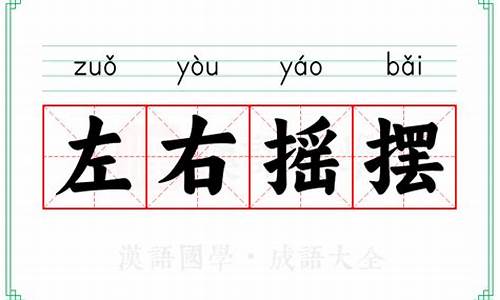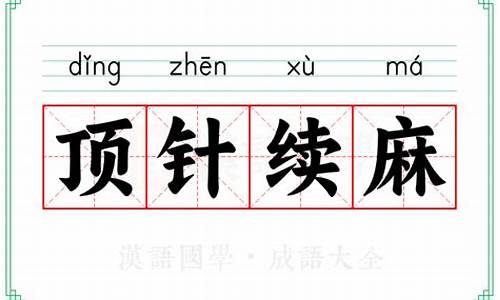无可置疑怎么写-无可置疑的英语
1.复试英语怎么准备
2.英语翻译
3.无可四字成语大全
4.英语语法原则就远原则
复试英语怎么准备

1、笨鸟先飞,注重基础。
无可置疑,英语学习需要一个长期的过程,成绩的获得不是一蹴而就的,而是日积月累。如果英语基础薄弱,就请大家像我一样,提前着手准备。所以我的经验之一就是复习要早动手投入准备。
单词是一切的基础,但是提醒大家切忌记硬背!我们可以根据大纲和历年考查频率比较高的词汇开始记忆!每天不断翻新,并且让背记过程与巩固复习同时进行。每天抽出一定的时间记住一定量的单词是必做的基础功课。
另外,阅读理解也要每天都加以训练。我复习的时候是一天训练两篇,自己做完后对着翻译再把文章分析一遍。弄懂弄透彻,这样才可以安心放下再去做其它的联系,并且把生词吃透消化掉,这时候叫做趁热打铁,对扩充词汇量效果很好。阅读理解重要的是培养语感和自己分析问题的能力,所以,大家在练习的时候要注重加强这两点。至于翻译和作文的训练那应该在后期训练,前期就不用投入太多的精力。完型填空可以从复习准备的中期开始准备。
2、理论应用于时间,真题训练
复习过程中,我印象最深刻的时期是看真题那个阶段。真题中阅读理解部分选文的内容,大多是关于国外尤其是美国的经济、科技、环境、就业以及社会问题的内容。由于我缺乏相应的知识背景,所以,在最初接触这类文章时,很难一遍就看懂。这就严重影响到了做题的速度。这时我就在平日里多关注各方面的新闻,一方面及时补充,另一方面主要是培养一个感觉。后来就不在对那些阅读感觉到陌生了。
总结起来,个人认为研究真题确实重要,但是要在学习的过程中避免一些不良的学习习惯,例如,有些人把真题做完就丢了,不去仔细研究选项和出题的特点;或者看题时蜻蜓点水,似懂非懂;把真题当作模拟题,临考才做。所以复习就要拿出认真的态度,要做到好读书,且求甚解。我相信只要你坚持了一条路走下去,一点会看到彩虹。
英语翻译
Greek mythology is the first of the European People's verbal creativity, the number of its 100 years after ancient Greek word of mouth.
God in Greek mythology, including the story of heroes and legends of two parts. God's story of the universe and the origin of mankind, God's produce, and more. Legend has it that in ancient Greece Olympus 12 major gods: Zeus, Hera, Athena, Apollo, Efuluodi, such as listeriosis. They charge of the various natural phenomena and living with things.
I introduce this book, not only because it was in Europe have far-reaching impact on literature, but also because it showed the ugly side of human darkness. Although Greek mythology is extolling the heroic deeds, but I think also deeply expose and criticize the evil of human nature, there is no doubt that in Greek mythology, gods and people, both the United States and the body, it was also the Qiqingliuyu And understand feelings, but Therefore, God also exist in the human selfishness and ugly.
In addition, in Greek mythology in the Bronze Age human beings, that is, Zeus created the third generation of human beings of the times, there is a Lvka Weng called the King is very arrogant, posed as ordinary people on the Zeus arrogant and unreasonable. So Zeus Olympus return to the Holy Land, to discuss with the gods, with heavy rain punished the whole earth, wind swept all, calls the flood inundated the world, leading to near-extinction of human final. This is a brutal, of course, is undesirable. On all Greek mythology theme of the story in retaliation, has such a bloody nature, embodies the people's narrow-minded, selfish dark side.
Greek mythology to the people of God have made a real show, not whitewash a bright future, not to cover up the dark. The people of God, which are treated equally. Not because he is a hero to cover their despicable, not because he is God and to conceal their hypocrisy.
无可四字成语大全
1、无可厚非
释义:意思是指说话做事虽有缺点,但还有可取之处,应予谅解。
出处:东汉·班固《汉书·王莽传》中:“莽怒,免英官。后颇觉悟,曰:'英亦未可厚非。'复以英为长沙连率。”
译文:王莽大怒,免了英的官职。后来有所醒悟,说:'英也不是没有可取之处。'后来又把英调为长沙郡连率。
2、无言可对
释义:意思是没有话来回答。
出处:宋·释普济《五灯会元》卷四:“师曰:‘这老和尚被我一问直得无言可对。’”
译文:这老和尚被我一问直得没有话可回答。
3、无懈可击
释义:意思是没有可以被人攻击或挑剔的缝隙,形容非常严密。
出处:《孙子·计》:“攻其无备,出其不意。”曹操注:“击其懈怠,出其空虚。”
译文:要攻打对方没有防备的地方,在对方没有料到的时机发动进攻。“曹操说:“攻击他们松懈,从他们松懈的时候。
4、无家可归
释义:意思是没有家可回,指流离失所。
出处:明·凌濛初《初刻拍案惊奇》卷二十二:“寺僧见了他无了根蒂,渐渐怠慢,不肯相留。要回故乡,已此无家可归。”
译文:寺中的僧人见了他没有了根蒂,慢慢地怠慢他,互相不肯留他下。他要回故乡,已经这样无家可归。
5、无可奈何
释义:意思是指感到没有办法,只有这样了。
出处:《史记·周本纪》:“祸成矣,载可奈何。”
译文:灾祸已经造成了,还能怎么办呢,只能这样了。
百度百科-无可厚非
百度百科-无言以对
百度百科-无懈可击
百度百科-无家可归
百度百科-无可奈何
英语语法原则就远原则
英语语法中有许多不是课堂能学到的东西,就例如就远原则,我在这里整理了相关资料,希望能帮助到您。
英语语法中的就远原则
当用作主语的成分后面跟有由but, except, besides, including, like, with, as well as, as much as, no less than, along with, in addition to, combined with, rather than, together with等引出的短语时,谓语动词习惯上要与这些结构前面的主语保持一致(即与比较远的那个主语保持一致)。
基本简介
as well as;(together/along/combined)with;rather than;except;besides;but;including;in addition to;apart from, like, as much as, no less than,
例句
Nobody but two students is in the classroom.除了这两个学生,没有人在教室
Everybody except you is down on me. 除了你,大家都看不起我。
A woman with two children has come. 一位妇女带着两个孩子已经来了。
John, rather than his roommates, is to blame. 约翰,而不是他的室友,应该受到责备。
Jim, together with his classmates, has seen the film. 吉姆和他的同学一起看了这部**。
My father, no less than I, is a base-ball fan. 我的父亲不亚于我也是个棒球迷。
The son, as well as his parents, wants to go there. 不但儿子想去那儿,而且他的父母也想去。
The teacher, as well as the students, is interested in the activity. 老师也和同学们一样对这项活动有兴趣。
具体分类
一、由 or,not only ? but also ?, either ? or ?, neither ? nor ?,not ? but ?等连接两个名词作主语时,谓语动词的单复数形式要根据就近原则来确定。
如:
You or he is going to be sent to study abroad .
He or we are going to be sent to study abroad .
二、“名词 + 介词 / 介词短语( with,together with,along with,as well as 等) + 名词”作主语时,谓语动词的单复数由介词前的名词的单复数形式决定。
如:
Tom as well as his parents enjoys fishing .
You as well as your brother have been accept-ed .
三、主语从句、不定式或动名词作主语时,谓语动词要用单数形式。
如:
What we can?t get seems better than what we have .
Taking more exercise is good for your health .
四、定语从句中,当先行词在从句中作主语时,从句谓语与先行词的人称和数保持一致;但“ one of + 名词复数”作先行词时,如在 one 前有 the,the very,the only 等词修饰时,从句谓语动词要用单数形式,若没有,则用复数形式。
如:
He is one of the students who have been praised by the headmaster .
He is the only one of the students who has been praised by the headmaster .
五、there be 句型中,be 的单复数形式由其后的名词决定,如果有两个或两个以上的名词,则按就近原则决定。
如:
There is only a desk in the room .
There is only a desk and two chairs in the room .
There are two chairs and a desk in the room .
六、“ the + 形容词”作主语表示一类人时,谓语动词一般用复数形式。
如:
The rich don?t understand the life of the poor .
初中英语的八种否定形式
? 01 ?
完全否定英语中的完全否定可以用:
not, no, never, none, nobody, nothing, neither...nor, nowhere等表示。
如:
1.Nothing is difficult for him. 没什么难得到他。
2.Mary never has beef. 玛丽从来不吃牛肉。
3.Neither answer is correct. 两种答案都不对。
? 02 ?
部分否定英语中表示“全体”意义的代词, 形容词或副词。
如:all, both, altogether, always, completely, every day, everyone, everything, everywhere, every, everybody, many, often等
与not搭配时,通常表示部分否定,意思是“并非都是”“不完全是”“不是每个都是”等。
如:
1.Not everyone was amused by these April Fool's jokes.
并不是每个人都觉得这些玩笑有趣。
2.Food likes and dislikes do not always seem related to nutrition. 对食物的好恶似乎并不总与营养有关。
比较:
Nothing makes him happy.
(全部否定)没有哪一件事情让他开心。
Not everything makes him happy.
(部分否定)并不是每一件事都让他开心。
None of the students went to visit the science museum last week.(完全否定)上周没有一个学生去参观科技博物馆。
Not all of the students went to visit the science museum last week.(部分否定)上周并不是所有的学生都去参观了科技博物馆。
? 03?
几乎否定一些半否定词表否定之意。他们不可再与否定词连用,他们与谓语肯定式连用,构成几乎否定句。
如:hardly, scarcely, seldom, little, few等词。
如:
1.I could hardly hear what he said.
我几乎没听见他说了什么。
2.There is little water in the bottle, isn't there?
瓶子里几乎没有水,不是吗?
? 04 ?
双重否定双重否定句由not + 具有否定意义的词构成,形成“否定+否定=肯定”的语言效果。
双重否定可以表示强调,也可以表示委婉的含义。
如:
1.Her name can't escape me forever.
我永远忘不了她的名字。
2.The songs never fail to make the children smile.
这些歌曲一向都能使孩子微笑。
? 05 ?
转移否定转移否定,即句中的否定虽然出现在谓语部分,否定范围却不在主句谓语动词本身,而转移到了句子中的宾语、状语或其他成分上。这种形式在初中比较常见的有以下两种情况:
1.转移否定多用于表思维活动
如:believe(相信), expect(期望), hope(希望), imagine(想象), think(认为)等。
例如:
I don't think he will pass the exam.
我认为他考试会不及格的。
2.主句的谓语动词是表感觉的系动词,通常也用于转移否定句
这类动词有:seem(好像), feel(感觉), appear(出现), look like(看起来像)等。
如:
It doesn't look like it's going to rain.=It looks like it isn't going to rain. 好象不会下雨。
No matter how hard he studies, he never seems to be able to pass the exam. 不管他多么努力的学习,他似乎永远也考不及格。
? 06 ?
运用某些结构表达否定意义1.too...to 太?而不能
He is too tired to walk. 他太累了,走不动了。
2.more A than B(与其B不如A)或more than +含有can的从句
The young man is more brave than wise.
这年轻人有勇无谋。
The gratitude for your help is more than I can express.
对于你给我的感激之情我无法言表。
3.prefer to do sth rather than do sth 宁愿(喜欢)?而不愿?,如:
He prefers to write his letters rather than dictate them.
他喜欢自己写信而不愿口授自己的信。
? 07 ?
运用含否定意义的词或词组表否定意义1.动词短语表否定意义
如:
differ from 与?不同
prefer...to... 喜欢?而不喜欢?
keep/prevent/stop/protect ... from 阻止,使?不
keep off 不接近, 不让?接近
lose sight of 看不见
例如:
The Great Green Wall stops the sand from moving to the rich land in the south.
绿色长城阻止了风沙吹向南方肥沃的田地。
He lost sight of his wife and went away alone.
他没看见他的妻子,独自走了。
Sally prefers singing to dancing.
莎丽喜欢唱歌而不喜欢跳舞。
2.动词表否定意义
如,absent(缺席), fail(不及格), refuse(拒绝), miss(未赶上,错过), escape(被?忘掉)等。
例如:
Why did you absent yourself from school yesterday?
昨天你为什么不来上学?
He missed the 9:30 train and therefore missed the accident.
他没赶上9:30的那班火车,也因此而逃过那次车祸.
3.介词表否定意义
without(无,没有), against(反对), beyond(超出,无法), except/but(除?外), past(超过), off(离开), above(超出?之外)等。
例如:
I can't finish the work without your help.
没有你的帮助,我完不成这工作。
His conduct has always been above suspicion.
他的行为一直无可置疑。
His stupidity is past all belief.
他的愚蠢简直不可思义。
? 08 ?
运用连词before unless等
引导的状语表否定意义如:
WangWei went to bed before he finished his homework.
王伟没完成作业就睡觉了。
Unless you put on your overcoat, you'll catch a cold.
声明:本站所有文章资源内容,如无特殊说明或标注,均为采集网络资源。如若本站内容侵犯了原著者的合法权益,可联系本站删除。












